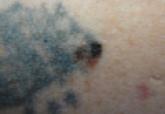Article

Melanoma Arising in a Tattoo: Case Report and Review of the Literature
Various benign and malignant lesions have been described in relation to tattoos including melanoma. Few cases of malignant melanoma (MM) arising...
Dr. Rosen is Professor of Dermatology, Baylor College of Medicine, Houston, Texas.
Dr. Rosen reports no conflicts of interest in relation to this post.


I have taken beta-blockers for nearly 30 years to combat a non–life-threatening but very disconcerting supraventricular arrhythmia. Also being fair skinned and having suffered through many a blistering sunburn in my youth, I was excited to read the most recent publication regarding the relationship between beta-blocker ingestion and survival from melanoma by De Giorgi et al (Mayo Clin Proc. 2013;88:1196-1203). The Italian investigators collected data from all melanoma patients diagnosed in the dermatology department at the University of Florence (1993-2009). After excluding patients who presented with metastatic disease, they then compared the courses of the remaining patients based on whether or not they had been prescribed beta-blockers for at least 1 year before or after their cutaneous melanoma diagnosis. Of 741 consecutive patients who fit the retrospective study criteria, 79 (11%) had been taking beta-blockers and the remaining 662 (89%) had not been taking beta-blockers.
An analysis based on the multivariate Cox model indicated that the beta-blocker group had improved overall survival after a median follow-up of 4.2 years (P=.005). Looked at in another way, significantly more patients in the untreated group (8%) than the beta-blocker group (3%) experienced disease progression or death (P<.001). The “protective” effect of beta-blockers was so striking that it could be quantified; for each year of beta-blocker use, the risk for death was reduced by 38%. More notable was the fact that the beneficial effect of beta-blocker administration was consistent, even among patients with inherently unfavorable prognostic factors, such as advanced age, thicker lesions, higher frequency of mitoses and ulceration, and nodular melanoma subtype. This large study confirms the results of a much smaller study (N=121) published by the same group in 2011 (Arch Intern Med. 2011;171:779-781).
What’s the issue?
Why might this phenomenon occur? Perhaps blocking sympathetic nervous system neurotransmitters might help avoid the suspected immunosuppression that accompanies stress. Sympathetic neurotransmitters also are known to interact with molecular pathways implicated in abnormal cellular replication, such as the p38/MAPK pathway. Thus, blunting the effects of epinephrine and norepinephrine by blocking some of their receptors might produce a salutatory benefit in the cancer (in this case, melanoma) patient.
Before we all rush out and give all our melanoma patients daily doses of metoprolol, however, De Giorgi et al noted in the most recent study that about two-thirds of the patients were already taking a beta-blocker when their melanoma was diagnosed. Although this study suggests that beta-blockers reduce the risk for recurrence and disease-specific mortality, these drugs clearly do not prevent melanoma in the first place. Furthermore, it should be noted that the number of melanoma patients receiving beta-blockers was small, and conclusions should always be tempered in a retrospective study. The authors duly admit that their investigation indicates the strong need for a truly randomized prospective clinical trial. Of course, administration of beta-blockers is not a totally benign endeavor, as serious hypotension and/or bradycardia may occur, leading to syncope or even worse problems. Finally, the evidence of beta-blocker benefit in melanoma patients is contradictory! A Dutch cohort of 709 melanoma patients recently was studied (Eur J Cancer. 2013;49:3863-3871); this set of investigators found that exposure to beta-blockers did not impact overall melanoma survival regardless of the timing, duration, or dosage of beta-blocker use. In summary, therefore, we still need to determine many things about the relationship between beta-blockers and melanoma survival. That is, if there is a relationship at all. What do you think?

Various benign and malignant lesions have been described in relation to tattoos including melanoma. Few cases of malignant melanoma (MM) arising...
The incidence of melanoma is increasing in the United States in all segments of the population. Although cutaneous malignancies in childhood...

The British Journal of Dermatology recently described prognostic data regarding 1693 consecutive melanoma patients (American Joint...

JAMA Dermatology (formerly Archives of Dermatology) reported a study (Arch Dermatol. 2012;148:1083-1084) on the diagnosis of...

Dr. Ferris discusses the early detection of melanoma utilizing patient and physician screening.
